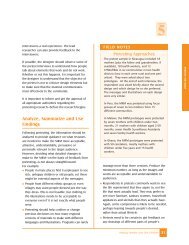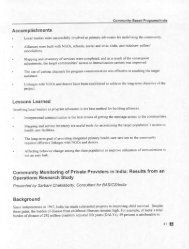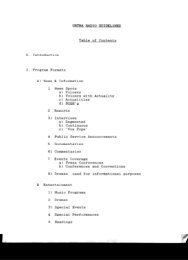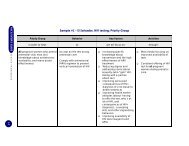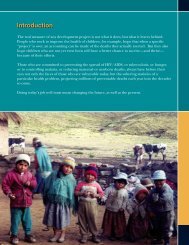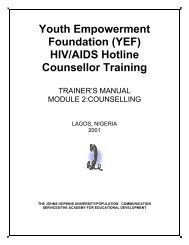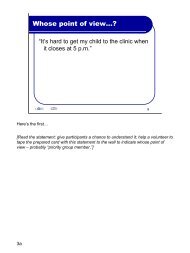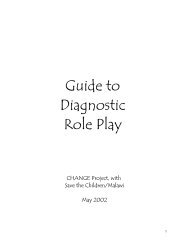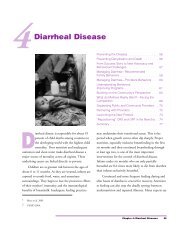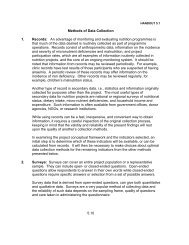MODULE TWO: COUNSELLING - FHI 360 Center for Global Health ...
MODULE TWO: COUNSELLING - FHI 360 Center for Global Health ...
MODULE TWO: COUNSELLING - FHI 360 Center for Global Health ...
You also want an ePaper? Increase the reach of your titles
YUMPU automatically turns print PDFs into web optimized ePapers that Google loves.
Counselling Rules<br />
• Do not give out personal in<strong>for</strong>mation. This includes your full name, your<br />
home phone number, where you work, where you live, your HIV status, etc.<br />
• Remember your limitations. You are a (volunteer) counsellor and not a<br />
therapist, psychologist or medical doctor. Callers with severe problems<br />
should be referred to other services.<br />
• Feel free to say « I don’t know, but I can try and find out <strong>for</strong> you. »<br />
You are not expected to know everything as a counsellor. It is okay to tell a<br />
caller that you do not have the in<strong>for</strong>mation they are seeking, but you can try<br />
and find it <strong>for</strong> them.<br />
• Do not meet a caller. Meeting a caller is strictly <strong>for</strong>bidden, both <strong>for</strong> safety<br />
reasons and also because it compromises the anonymity of the hotline. If a<br />
caller seeks face-to-face counselling, refer him/her to other services.<br />
• Keep it confidential. All conversations with callers must be kept strictly<br />
confidential. Counsellors may need to consult YEF HIV/AIDS Hotline staff <strong>for</strong><br />
help with difficult calls, but in no case should in<strong>for</strong>mation about calls be<br />
disclosed to persons outside of the hotline.<br />
• Do not judge or moralise. Accept callers as they are. This includes their<br />
background, beliefs, attitudes and actions. Clients have a right to their own<br />
value systems. S/he does not want to be told what is right and what is<br />
wrong from the counsellor’s perspective.<br />
• Do not prescribe treatment <strong>for</strong> AIDS or other illnesses. In most cases,<br />
volunteer counsellors are not certified health workers. It is not the<br />
counsellor’s role to give medical advice. Counsellors can give limited medical<br />
in<strong>for</strong>mation, but they should not try and advise a caller about his/her<br />
particular medical situation. Callers should be encouraged to visit a doctor or<br />
other health professional.<br />
• Do not reassure. Never say, « Everything will come right » to a caller. You<br />
cannot see the future, and this may not be true. False assurances will not<br />
help a caller to deal with his/her situation in a realistic manner.<br />
• Do not block strong emotions. One of the main purposes of counselling<br />
is to help a client express their emotions. Strong emotions need to be<br />
expressed. They can be potentially destructive if kept inside.<br />
Session 7- Pg. 5



